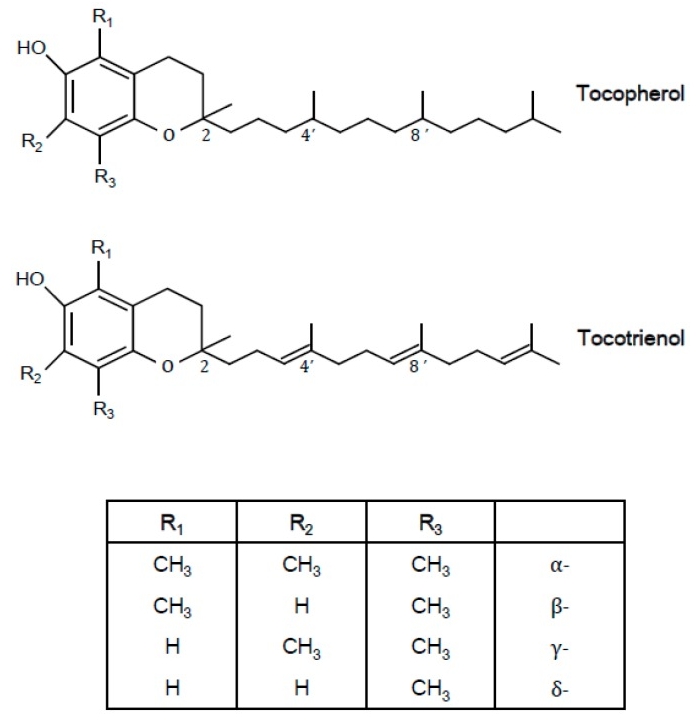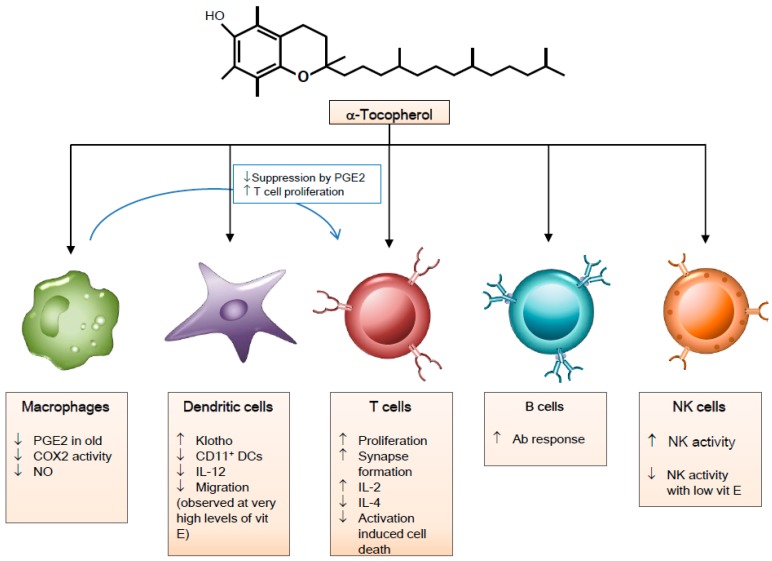Lee Ga Young, et al.
Nutrients, 2018
Abstract
Vitamin E is a fat-soluble antioxidant that can protect the polyunsaturated fatty acids (PUFAs) in the membrane from oxidation, regulate the production of reactive oxygen species (ROS) and reactive nitrogen species (RNS), and modulate signal transduction. Immunomodulatory effects of vitamin E have been observed in animal and human models under normal and disease conditions. With advances in understating of the development, function, and regulation of dendritic cells (DCs), macrophages, natural killer (NK) cells, T cells, and B cells, recent studies have focused on vitamin E's effects on specific immune cells. This review will summarize the immunological changes observed with vitamin E intervention in animals and humans, and then describe the cell-specific effects of vitamin E in order to understand the mechanisms of immunomodulation and implications of vitamin E for immunological diseases.
Keywords
T cells; dendritic cells; immunomodulation; infection; macrophages; vitamin E.
Conflict of interest statement
The author declares no conflicts of interests.Figures

The structures of tocopherol and tocotrienols

Immunomodulatory effects of vitamin E on immune cells. Abbreviations : PGE2, prostaglandin E2; COX2, Cyclooxygenase 2; NO, Nitric oxide; CD, Clusters of Differentiation; DCs, Dendritic cells; IL-12, Interleukin-12; Ab, antibody; NK, Natural killer.
| PMID: | 30388871 |
|---|---|
| DOI: | 10.3390/nu10111614 |
| PMCID (Free PMC Article): | PMC6266234 |
| Category: | Immune |
The best supplements with Vitamin E in Immune category:
- Immunity 911 - Extra Powerful Ingredients for Your Stronger Immunity -
Immunity 911 - Advanced Immune Boster Formula Your First Line Of Defense Against Infection!
Viruses are floating all around us, ready to filter into our body any moment completely unnoticed. It contains among others: Vitamin E. - Immune Defence - Zinc Lozenges with Rosehip and Acerola - Your immune system needs daily support to stay in good form, to be able to fight off any pathogens trying to enter your system and to witstand the impact of stress on your body and mind. It contains among others: Vitamin E.
- Astaxanthin, 10 mg, 60 Softgels (Now Foods) - NOW Astaxanthin is a naturally occurring carotenoid that, due to its unique structure, performs an important role in cellular free radical protection and healthy immune system responses. It contains among others: Vitamin E.
Articles similar to "The Role of Vitamin E in Immunity."
- The role of Vitamin E in Immune: Perspective: Should Vitamin E Recommendations for Older Adults Be Increased?. (Current vitamin E requirements are uniformly applied across the population for those >14 y of age...)
- The impact of Vitamin E on Immune: Role of Vitamin E in Immune System. (Vitamin E is a potent antioxidant and has an ability to modulate host immune functions...)
- The significance of Vitamin E for Immune: The Effects of Oral Supplements With Sambucus Nigra, Zinc, Tyndallized Lactobacillus Acidophilus (HA122), Arabinogalactans, Vitamin D, Vitamin E and Vitamin C in Otitis Media With Effusion in Children: A Randomized Controlled Trial. (Objective: To evaluate the ability of oral supplements with immune-stimulating molecules (Sambucus nigra, Zinc, Tyndallized Lactobacillus acidophilus (HA122), Arabinogalactans, vitamin D, vitamin E and vitamin C) to reduce the inflammation of the upper airway tract and improve the outcome of otitis media with effusion (OME) in children... OS with immune-stimulating molecules should be considered as a supporting therapy in children affected by recurrent episodes of UAI associated with OME due to their capacity to improve the immune response and reduce the inflammatory phenomena. OS can improve the fibroendoscopic findings by restoring middle ear ventilation, in addition to their ability to reduce inflammation in the middle ear.)
- The role of Vitamin E in Immune: Role of Vitamins D, E and C in Immunity and Inflammation. (Inflammatory responses are operationally characterized by pain, redness, heat and swelling at the site of infection and trauma... OS with immune-stimulating molecules should be considered as a supporting therapy in children affected by recurrent episodes of UAI associated with OME due to their capacity to improve the immune response and reduce the inflammatory phenomena. OS can improve the fibroendoscopic findings by restoring middle ear ventilation, in addition to their ability to reduce inflammation in the middle ear.)
Previous article
Role of Vitamin A in the Immune System.
Next article
Perspective: Should Vitamin E Recommendations for Older Adults Be Increased?.

























































